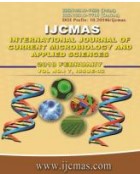


 National Academy of Agricultural Sciences (NAAS)
National Academy of Agricultural Sciences (NAAS)

|
PRINT ISSN : 2319-7692
Online ISSN : 2319-7706 Issues : 12 per year Publisher : Excellent Publishers Email : editorijcmas@gmail.com / submit@ijcmas.com Editor-in-chief: Dr.M.Prakash Index Copernicus ICV 2018: 95.39 NAAS RATING 2020: 5.38 |
Among biotic stresses affecting maize, the pre-harvest aflatoxin contamination produced by Aspergillus flavus and turcicum leaf blight (TLB) caused by Excerohilum turcicum are most important diseases in India. Resistance of maize to aflatoxin contamination and TLB, is a penultimate goal in breeding programs that screen for these important traits with the aim of developing resistant commercial hybrids. Hence a study on reaction of 26 inbred lines of heat tolerant maize to both the diseases was conducted under artificial epiphytotic field conditions for two seasons. Among 26 inbred lines evaluated for TLB, 10 lines namely CAH-1533, CAH-1505, CAH-158, CAH-1437, H-15002, E-5, CAH-1526, CAH-1454, CAH-1532 and CAH-1545 showed resistant reaction. Whereas five lines were found moderately resistant viz., CAH-1551, CAH-1504, CAH-1564, CAH-1536 and CAH-1501 and remaining were severely affected by TLB and rated them as susceptible. Study on reaction of 28 inbred lines for aflatoxin contamination revealed that, among them none were immune, whereas nine lines namely CAH-1546, CAH-1525, H-15001, ARLUM, CAH-1437, CAH-1503, CAH-1526, CAH-1545 and CI-4 were highly resistant to aflatoxin contamination. The resistant reaction was exhibited by 17 lines, while two inbred lines namely CAH-1551 and CAH-1501 showed moderately resistant to aflatoxin contamination. Thus the above lines were identified as promising sources of resistance and can be used successfully in developing desirable level of resistance in disease endemic areas to aim for sustainable productivity.
 |
 |
 |
 |
 |